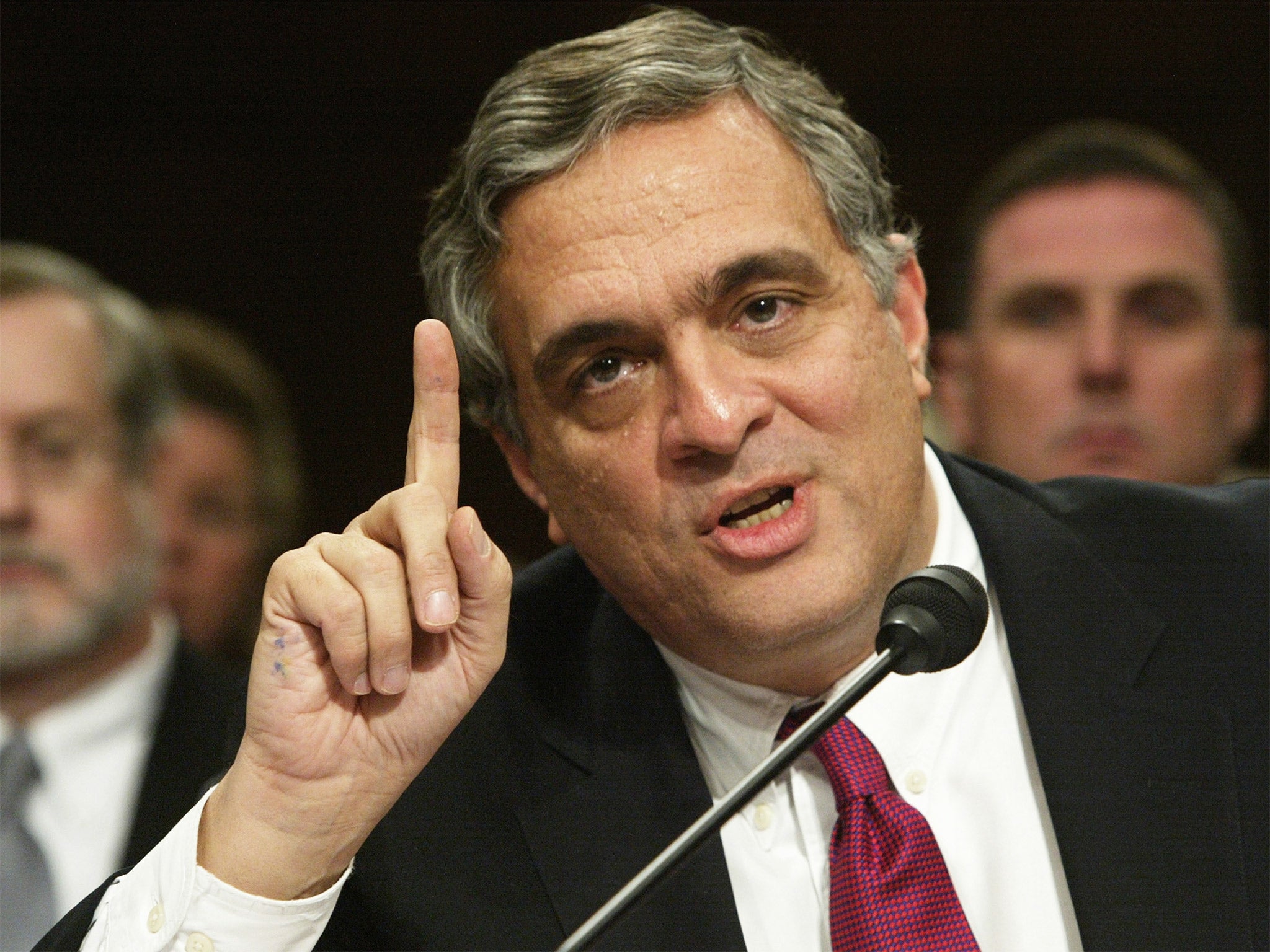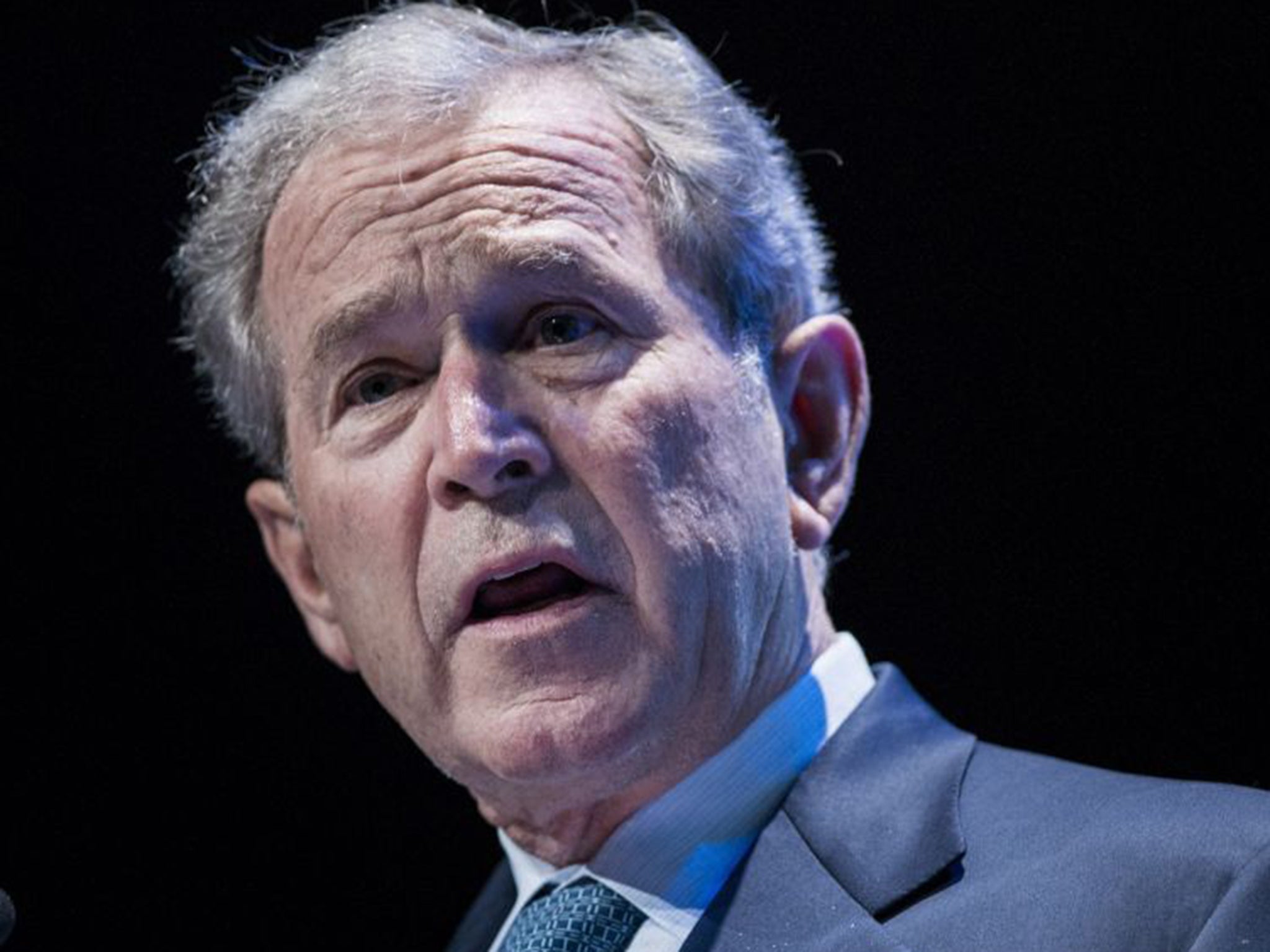George Tenet: The torturer-in-chief?
The man who presided over the CIA's most shameful period is now coming under serious interrogation himself

If foreign travel is in George Tenet’s Christmas plans, he may want to reconsider. Human rights groups bayed last week for former top CIA and Bush-era officials to be tried, outside America if need be, for allegedly abetting the torture of terror detainees after 9/11.
Tenet is surely high on their target list.
On the other hand, Tenet, 61, who served Presidents Bill Clinton and George W Bush from July 1997 to July 2004 as the director of the CIA, is a man not easily intimidated. Possessed of an imposing frame and mien, he becomes angry whenever he feels cornered about his years atop the famed (and now benighted) spy agency. Those who have interviewed him know he gives no quarter.
The spot he is in is tighter than ever. While the damning conclusions of the report released on Tuesday by the Senate Select Committee on Intelligence on America’s rendition and secret interrogations programme have impelled quite a coterie of potentially implicated individuals to cry foul, including former Vice-President Dick Cheney and other ex-CIA chiefs, it is Tenet who stands most visibly in the dock.
A son of Greek immigrants – his mother stowed away on a British submarine fleeing the communists and his father arrived in the US via Ellis Island before the Great Depression –Tenet grew up waiting tables in the family’s diner in Queens, New York. He had a reputation as a loudmouth. But he was clever too and was to study diplomacy at Georgetown and Columbia, Ivy League universities both.
The second longest-serving director of the CIA, he was only 44 years old when he first got the job. It might not have been, but Clinton’s first choice at the time, Anthony Lake, concluded late in the game that he couldn’t win confirmation in the Senate and withdrew his name. That meant second-choice Tenet. The busboy from Queens had travelled from dolloping moussaka to tracking Osama bin Laden.
His proudest moment theoretically came shortly after leaving the agency in December 2004 when President Bush awarded him the Presidential Medal of Freedom. Yet since then, calls have been made twice on him to return it, as an admission of shame. One came in the form of an open letter from former CIA colleagues, no less, in 2007. The other was made in an editorial in The New York Times last week.
Amid the Iraqi quagmire, Tenet might reasonably have felt relief quitting government. He took to teaching diplomacy at his alma mater, Georgetown, where he remains today, and making money with stints as a non-executive board member of the British defence contractor Qinetiq and managing director of the investment bank Allen & Company. He could also return, as they do, to family: his wife, Stephanie Glakas-Tenet, and their one son. But there was also the urgent matter of resurrecting his reputation. He had, after all, left the service of Bush with a knife conspicuously planted in his back.

It was always going to be tough. Consider what happened under his watch. Terrorists linked to a then unfamiliar network called al-Qaeda blew up US embassies in East Africa in 1998 and bombed the USS Cole in Aden in 2000, killing 17 sailors. The CIA caught a large part of the blame when Osama bin Laden turned four planes into missiles over America on 11 September. It again was blackened as it became obvious that the weapons of mass destruction, WMD, it had said were in Saddam Hussein’s Iraq, used to justify the US-led 2003 invasion, were phantom. These were more than bumps in a career.
Come 2007, Tenet was hawking the inevitable memoir. It was aptly named At the Centre of the Storm. But if he thought the usual television shows and signings would help to refurbish his image, he was mistaken. By then yet another awkward issue was getting attention. Was it true that as part of the CIA’s secret rendition programme which he started, interrogators had been torturing al-Qaeda detainees?
In an appearance in April 2007 on the CBS programme 60 Minutes, Tenet fairly lunged at reporter Scott Pelley when the question was raised. “I want you to listen to me,” he barked. “We never torture people.” He repeated it five more times. He also flatly stated that no one died in the black-site dungeons. We learned this week one did. He froze to death, shackled and nearly naked. We also learned heinous torture happened; the CIA hid it and precious little – if any – intelligence was gleaned from it.
Defenders of Tenet would say he simply stepped into a particularly cruel tract of history. It was only a few months before the embassy bombings happened. After the 9/11 attacks, the CIA was hounded when it emerged that analysts had known of the presence in the US of two of the hijackers for 18 months before the attacks happened but hadn’t “joined the dots”. Yet it was true that Tenet had also been hammering on the Oval Office door for weeks warning that some serious attack might be coming.

He had also inherited an agency that was totally unprepared for the tasks given to it in the wake of 9/11. It found itself suddenly masterminding the first front in the invasion of Afghanistan to displace the Taliban – some would argue successfully, barring the fact that Bin Laden was to get away. It also had assigned the entirely daunting job of ensuring no other attacks on the homeland were launched, part of which meant squeezing every last drop of intelligence they could from the al-Qaeda detainees.
Tenet has said consistently he had nothing to do with the conflating of 9/11, al-Qaeda and Iraq. Justifying invading Iraq with reference to the Twin Towers “never made any sense”, he told Pelley. But his greatest sin was providing Bush (and by extension Tony Blair) with the National Intelligence Estimate asserting the presence of WMD in Iraq. This writer was in the chamber when then Secretary of State, Colin Powell, told the UN Security Council that the WMD case was not made of “assertions, but facts and findings”. Tenet, seated behind him, had put him there, lying to all the world.
It was a leak to Bob Woodward that did Tenet in. The veteran Washington Post reporter wrote that at a key Oval Office meeting with Bush, Cheney and a tight team of aides, he rapturously declared that deciding to go to war in Iraq was a “slam dunk” because of the WMD. It was a scene that Cheney would later repeatedly evoke. Tenet could never shake the slam-dunk moniker even though he has always insisted that what he actually said was that improving the presentation of the case for war would be a slam dunk, not anything else. In any event, he was out and had been made a scapegoat.
Even the UN has joined the clamour for prosecutions of those implicated by last week’s Senate report into torture. But the Justice Department is already demurring, and it’s too difficult to assess now whether the threat to Tenet or others of legal consequences in other jurisdictions is real. This much we can say with confidence, however: he is not about to surrender that medal.
A life in brief
Born: 5 January 1953, in Queens, New York City.
Family: Son of Greek immigrants Evangelia and John Tenet. Married to Stephanie Glakas-Tenet, a co-author of DIY books for women. They have one son.
Education: Georgetown school of foreign service, 1976; master’s from Columbia University, 1978.
Career: Director, Senate Intelligence Select Committee, 1988-93; special assistant to President Clinton; CIA director 1997-2004. Currently Georgetown professor.
Join our commenting forum
Join thought-provoking conversations, follow other Independent readers and see their replies
Comments